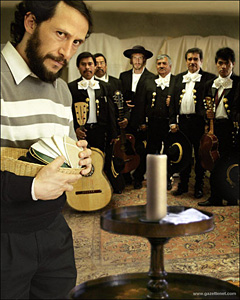 |
 |
 |
 Entertainment | March 2007 Entertainment | March 2007  
'It's Like a Soap Opera with Jewish Characters'
 Mary Carey - amherstbulletin.com Mary Carey - amherstbulletin.com


| | The film "My Mexican Shiva," a dramatic comedy set in the Jewish quarter of Mexico City, is based on a novella by Amherst College professor Ilan Stavans. |
The czar of Latino literature and culture in the United States, as the New York Times describes him, Amherst College professor Ilan Stavans grew up Jewish in overwhelmingly Catholic Mexico City, the son of a soap opera star.

If it sounds like material for a wry culture-clash comedy, it is. "My Mexican Shiva," based on Stavans' novella "Morirse Est? en Hebreo," which opened the New York City Jewish Film Festival in January, will make its New England debut March 28 at the University of Massachusetts, School of Management 137, at 7:30 p.m.

Directed by Alejandro Springall and produced by John Sayles, with an original score by the Klezmatics, it is being shown free of charge as part of the Pioneer Valley Jewish Film Festival and the UMass Multicultural Film Festival. Stavans will introduce and discuss the movie.

"It's like a soap opera with Jewish characters," Stavans, who should know from soaps, said of "My Mexican Shiva."

But Stavans did not conceive the novella on which it is based entirely as a comedy. Indeed, there are parts of "Morirse Est? en Hebreo" that are quite melancholy. The central event, after all, is the death of the protagonist Moishe Tartakovsky and the shiva, or the weeklong period of mourning customary in Jewish tradition, that follows.

"Mexico has been extraordinarily generous to me and to thousands of other Jewish immigrants," Moishe, the protagonist, reflects in videotape his niece shows to relatives at the Shiva after his death. "Have we been equally generous to Mexico? I'm not sure..."

Stavans, who is also the host of a syndicated PBS talk show, is such a prolific author that among the stack of books he has written is one titled "The Essential Ilan Stavans." In an essay written for The Daily Jewish Forward, Stavans describes "My Mexican Shiva" as a "less than subtle" adaptation, saying, "Springall reinterprets the material in an exaggerated manner, one suitable in cinematic terms."

As Stavans explains in his essay, Springall, who is also Jewish and whose work Stavans admires, visited him at Amherst College, where Springall told Stavans he dreamed of making a movie about Jews in Mexico City, who are less than 0.1 percent of the city's population.

"Should a movie come out from it," Stavans writes, "I remember telling myself during our chat, it would have the perspective of an affectionate outsider, which is more than fitting, given that Mexican Jews in my view retain a sense of uniqueness that makes them stand apart."

The two signed an agreement and several months later, Stavans sent him the novella, which was eventually collected in another of his books, "The Disappearance."

Stavans visited the set and even has a cameo appearance in the film - he plays the son of one of the protagonist's friends, who is played by Stavans' father, Abraham Stavans. There is a political dimension to the novella, in which the shiva is set against the backdrop of the election of Vicente Fox, a former Coca-Cola executive from the conservative Partido de Acci?n Nacional.

"Sadly, the political dimension was left out," Stavans said. "The film isn't a reflection on the perils of young democracies and the role that minorities play."

On the other hand, Springall embraces the symbolic - in part by including two bearded Hasiddic characters who fulfill the role of a Greek chorus, offering insight into the story with comments in Yiddish - "a decision I applaud," Stavans said. | 
 | |
 |



